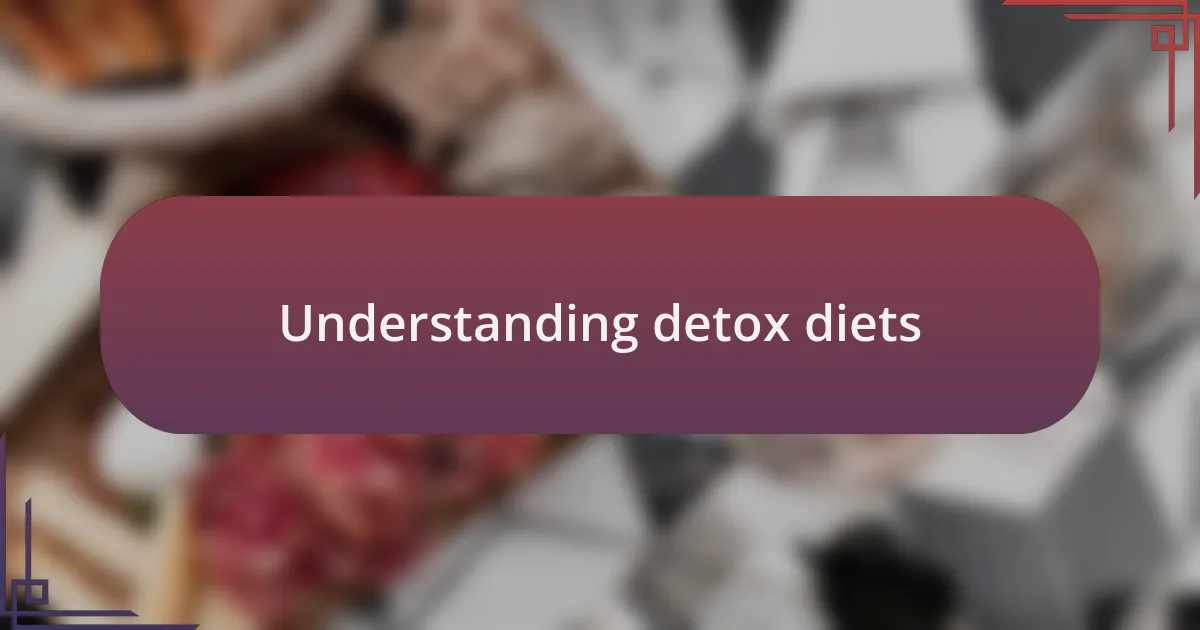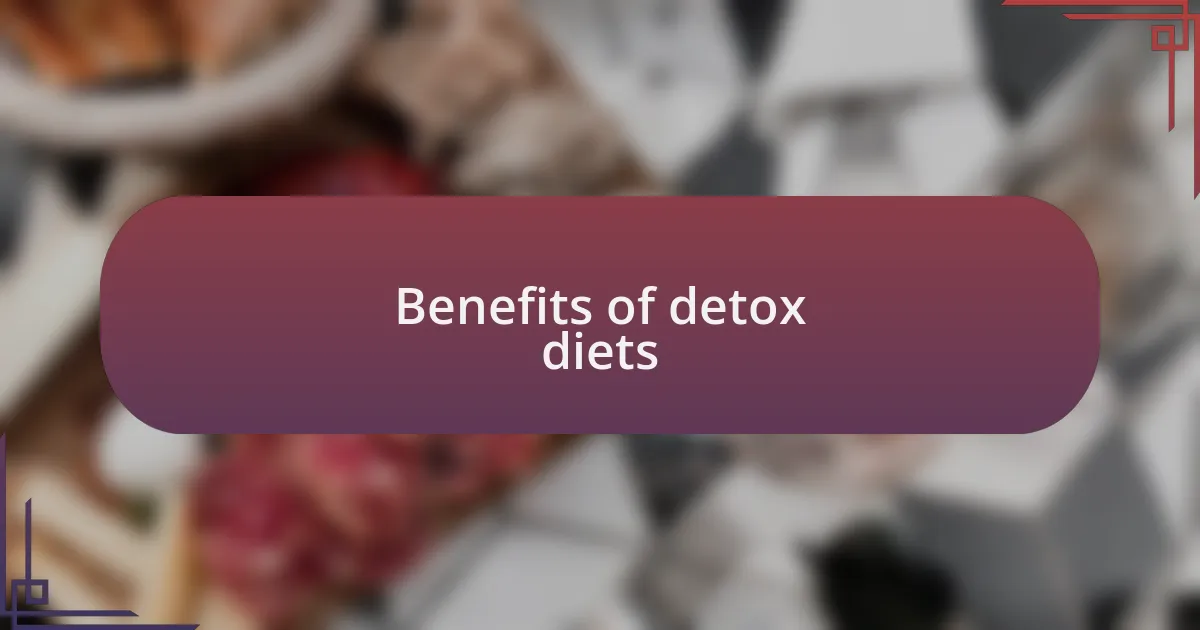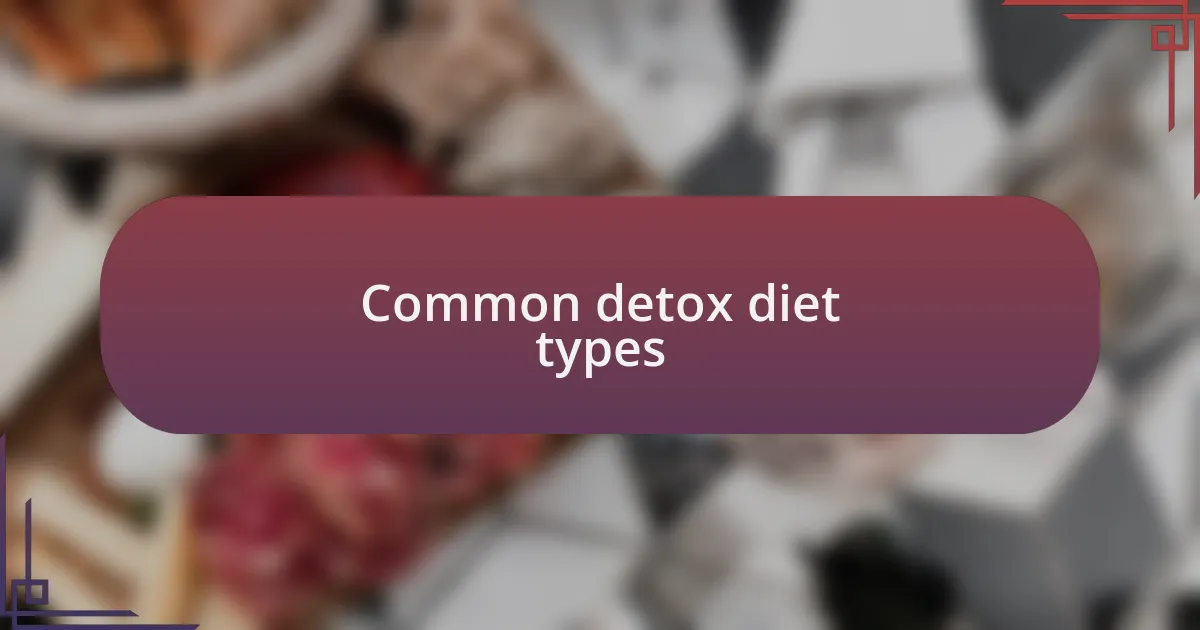Key takeaways:
- Detox diets aim to cleanse the body of toxins, but the necessity of such diets is questionable, as organs like the liver and kidneys naturally filter waste.
- While detox diets may initially boost energy and mental clarity, the sustainability of these benefits is uncertain and can lead to feelings of deprivation.
- Common detox types include juice cleanses, elimination diets, and broth detoxes, each with unique approaches and varying impacts on individuals’ well-being.
- The emotional and psychological effects of detox diets can be significant, often causing feelings of isolation and anxiety during the process.

Understanding detox diets
Detox diets are designed to cleanse the body of toxins while purportedly promoting better health and vitality. I’ve often wondered, though, whether the body really needs such assistance. Our organs, particularly the liver and kidneys, do a remarkable job of filtering out waste without any extra help from restrictive diets.
Reflecting on my own experiences, I remember the time I tried a juice cleanse. Initially, I felt energized, but within days, I found myself irritable and craving solid food. That stark realization made me question the sustainability and practicality of detox diets. Can a temporary fix truly lead to lasting results, or do we just end up back where we started?
Moreover, the emotional toll of detox diets is something I’ve witnessed in friends and family. They often feel isolated during the process, missing out on social meals and gatherings. Isn’t it intriguing how a diet meant to promote wellness can sometimes lead to feelings of deprivation and anxiety? Understanding the psychological impact is just as crucial as recognizing the physiological aspects of these diets.

Benefits of detox diets
The benefits of detox diets can often sound appealing. One major advantage is the potential for an initial boost in energy. I remember a friend who embarked on a detox smoothie regimen. She felt that surge of vitality early on, which led her to believe she was on the right track. It made me wonder, though, was it the smoothies themselves or just the absence of processed foods that gave her that energy lift?
Another benefit can be the mental clarity that some people report. During one of my brief attempts at a clean-eating plan, I experienced moments of sharp focus that shocked me. It led me to think about how our diet directly impacts our cognitive function. But it’s also important to question: is that clarity sustainable, or does it fade with the return of regular eating habits?
Detox diets often encourage individuals to develop healthier eating patterns. I’ve seen people, after a detox phase, become more mindful about their food choices. They become aware of how certain foods affect their well-being. This awareness can lead to lasting changes in one’s lifestyle—could that be the true essence of detoxing? It’s a reminder that while the detox phase may be temporary, the habits formed can indeed have a lasting impact.

Common detox diet types
Detox diets come in several popular forms, each with its unique approach. One widespread type is the juice cleanse, where individuals consume only fresh fruit and vegetable juices for a set period. I recall trying this method a few years back, and while the flavors were refreshing, I often found myself craving solid food—especially when I was surrounded by friends enjoying pizza.
Another common approach is the elimination diet, which removes specific food groups like dairy, gluten, or sugars to identify potential allergens or sensitivities. When I ventured into this territory, I noticed a significant difference in how my body reacted, particularly when I cut out gluten. It was eye-opening, but I couldn’t help but think: what if the answer isn’t to eliminate entirely, but rather to enjoy everything in moderation?
Then there’s the broth detox, where people consume primarily vegetable or bone broth for nourishment. While I’ve heard friends rave about its comforting qualities, I have to admit that my experience left me feeling more tired than rejuvenated. Is it possible that the simplicity of broth, while soothing, might not provide enough fuel for an active lifestyle? This brings to light the important consideration of balancing detox efforts with personal needs and activity levels.